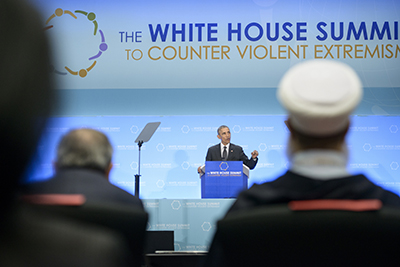In an effort to counter extremists and militant groups who use a mix of violence and social media to spread their message, a summit was held in Washington, D.C. this week to discuss how to counter violent extremism. While there is little denying that these groups must be tackled, an approach must be found that will not justify restricting the press.
The slick media arm of Islamic State led the White House to announce an international coalition, including Arab allies, that will fight the militant group on the virtual battlefield as well as on the ground.
The question that troubled me, as advocacy director of CPJ, is how to do this without legitimizing the behavior of repressive governments who could use the initiative as an excuse to clamp down on domestic dissent and criticism. How will the “countering violent extremism” initiative differentiate between legitimate criticism of, or resistance to, foreign policy? How will the U.S. respond to autocratic governments that use the initiative to counter domestic dissent?
Obama went some way to address this at the summit, which was attended by representatives from 60 countries, when he said governments that oppressed their people and denied them human rights sowed “the seeds of extremism and violence.” U.N. Secretary General Ban Ki-moon reiterated this sentiment, saying “preventing violent extremism and promoting human rights go hand-in-hand.”
Yet several states in attendance, including Bahrain, Egypt, and Kuwait, have imprisoned critical journalists, bloggers, and human rights activists and, in some cases, stripped them of citizenship. The pretext for such retaliation, in addition to laws on defamation and blasphemy, is often vaguely defined anti-terrorism and national security legislation, according to CPJ research.
In Egypt, CPJ research shows at least eight journalists are in jail for allegedly belonging to or covering the Muslim Brotherhood–a group banned after the democratically elected President Mohamed Morsi was ousted. Russia, which had a representative at the summit, uses official warnings to block access to critical websites and publications under its anti-terror legislation, and has imposed licensing requirements for blogs and social media users with more than 3,000 users per day.
The danger is that human rights, particularly freedom of expression, will be compromised amid the response to the January 7 attack in Paris on French satirical weekly Charlie Hebdo, and concern about violent extremism spreading through the Internet. According to CPJ research, often it is independent, local journalists who get caught in the ensuing crackdown. This StoryMap created by CPJ last month tracked the censorship efforts as global media responded to the Charlie Hebdo attack.
One of the outcomes from the summit is a plan for the U.S. to work with other governments and civil society to create digital content to counter violent extremist narratives. According to an official fact sheet from the summit, this will be achieved through “technology camps” organized by social media companies and a partnership with the United Arab Emirates.
Representatives from Google, Facebook and Twitter were also at the summit, but offered little detail on how they planned to work with the U.S. government. The same tech companies have been pushing back against U.S. surveillance programs by implementing anti-surveillance and encryption technologies to prevent spying in the name of national security. A Twitter spokesman told Politico the company plans to participate “through third party NGOs.”
Director of Google Ideas Jared Cohen participated in a session that included representatives from Kuwait, Bahrain and UAE–countries that have imprisoned citizens for expressing criticism online and use the anti-terrorism card to silence alternative voices. While the summit was taking place, a Kuwaiti court upheld the government’s decision to revoke the license of independent daily Al-Watan after a series of critical articles.
The summit comes amid calls by France, EU interior ministers, and Muslim-majority states for greater restrictions on online extremism, which would include holding social media platforms partially responsible for content. This would likely make it more difficult for civil society in repressive countries who rely on social media to engage in the public sphere because of concerns that legitimate critique would be interpreted as extremism. Just one example is the case of Alaa Abdel Fatah, an Egyptian activist who trained hundreds of bloggers how to use Web-based platforms to express themselves and who is now behind bars.
A central focus in Washington, D.C. was government efforts to discredit terrorists’ propaganda and hamper their ability to disseminate messages. It will be a challenge to distinguish these efforts from other attempts at information warfare and propaganda that the U.S. and others are, rightly, critical of.
The potential pitfalls of this approach is significant for journalism. The creation of content by government further blurs the line between information and propaganda, and provides cover to Russia, Iran, and China where, according to reports, brigades of online commentators are used to promote positive state messages.
The U.S. administration’s focus on counter-messaging is important, but unlikely to succeed as long as those reporting on extremist groups, expressing critical views, and commenting on religious matters are locked up. And CPJ, along with other human rights groups, is concerned that the countering violent extremism initiative could provide justification for governments to broaden surveillance online and use it to curb human rights and civil liberties.
